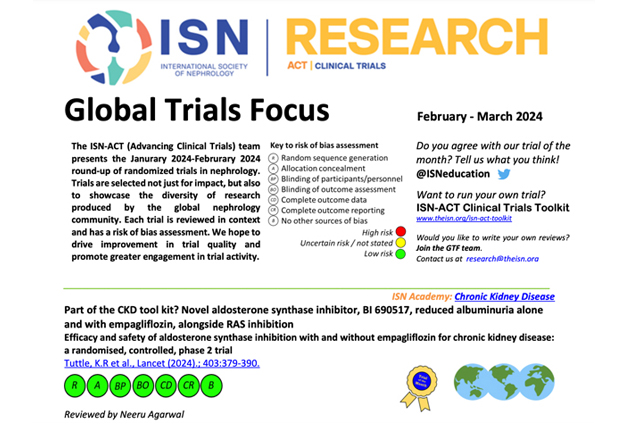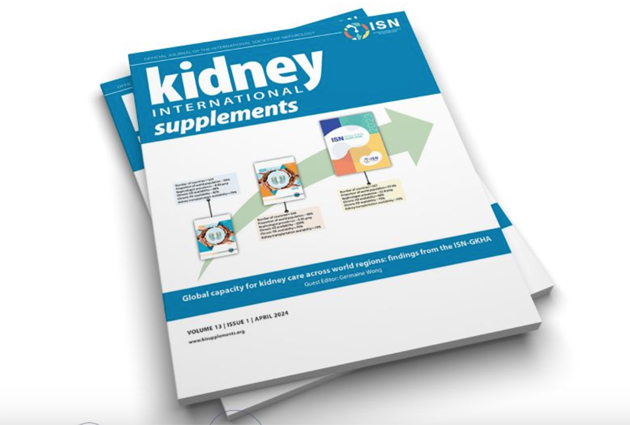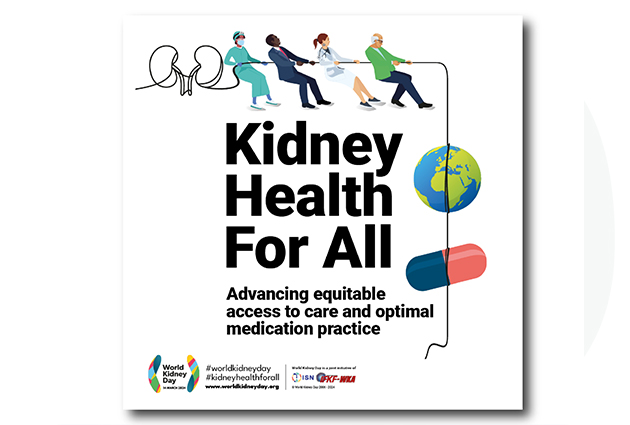ISN-ACT Global Trials Focus: CKD, dialysis and hypertension
This month, the first series of clinical trials curated by the ISN-Advancing Clinical Trials (ISN-ACT) team will get us thinking about nephrology research and encourage more discussion about chronic kidney disease, dialysis and hypertension: from PD catheter exit site care, the effectiveness of Roxadustat, to the initial treatment of hypertension in Sub-Saharan Africans and the role of CKD nurses in primary care.
The ISN-ACT team has collected some of the latest randomized research from nephrologists worldwide. Here, we focus on dialysis, hypertension and chronic kidney disease.
Join the debate @ISNeducation. Let us know if these trials will affect your practice? Are the results valid? How could the trials have been improved? What further studies are needed? If you would like to suggest any trials for inclusion in future editions, please send suggestions to research@theisn.org.
Read the main key points and outcomes of the following clinical trials. A list of all the ISN-ACT trial lists is also available on the ISN Academy, HERE.
Polyhexanide: an alternative to iodine for PD catheter exit site care
Topical antibiotic and antiseptic agents have been documented to reduce exit-site infection (ESI) and peritonitis in PD. The aim of this randomized controlled study was to evaluate the efficacy of polyhexanide in the prevention of ESI and peritonitis.
Key points
- Population: 93 peritoneal dialysis patients
- Intervention vs Comparator: Regular exit-site application of polyhexanide vs. povidone-iodine
- Time: 12 months.
Outcome
ESIs were similar, with 3 ESIs in the polyhexanide group and 5 ESIs in the povidone-iodine group (0.06 episodes/patient-year vs. 0.12 episodes/patient-year; P=NS).
Peritonitis rates were also similar, with 12 episodes with polyhexanide and 13 with povidone-iodine (0.26 episodes/patient-year vs. 0.32 episodes/patient-year, P=NS).
Polyhexanide appeared similarly effective to povidone-iodine for infection prophylaxis in patients on PD. However, the small size and methodological limitations of this study mean these findings should be interpreted with caution.
Roxadustat may be effectively dosed three times per week or weekly
This study evaluated the efficacy and safety/tolerability of Roxadustat, an oral hypoxia-inducible factor prolyl hydroxylase inhibitor, in Japanese anemic non-dialysis-dependent chronic kidney disease (NDD-CKD) patients.
Key points
- Population: 107 patients with non-dialysis dependent CKD and anemia
- Intervention vs Comparator: Roxadustat (thrice-weekly, variable dosing) vs. placebo
- Time: 24 weeks.
Outcome
The response rate (Hb > 100g/L or >10g/L above baseline) was 94% in the Roxadustat group vs. 15% in the placebo group (P<0.001).
A subgroup of 56 participants who achieved Hb>110g/L on Roxadustat were re-randomized to continue thrice-weekly dosing or to reduce to once-weekly dosing. Both approaches resulted in a mean Hb > 10g/L at week 24.
In addition to providing further evidence of the efficacy of Roxadustat, this study suggests that less frequent dosing is feasible, although the long-term safety of this approach is not yet known.
CKD practice nurse and regular medical record audit does not affect progression of CKD in primary care
This cluster randomized trial aims to assess the effect of a nurse-led and primary care-based CKD management program to improve the outcomes of patients with CKD.
Key points
- Population: 46 primary care practices
- Intervention vs Comparator: CKD nurse-specialist support to review and improve CKD care plus biannual medial record audit of renal function, blood pressure and related parameters vs. unsupported provision of biannual audit data
- Time: 42 months.
Outcome
There was no difference in change in eGFR. However, coding accuracy improved and, at most timepoints, patients in the intervention practices were more likely to achieve blood pressure targets.
Nurse-supported CKD management in primary care did not protect renal function, but improvements in some aspects of care were noted.
Perindopril-amlodipine equal to perindopril-indapamide in pilot BP lowering study in Sub-Saharan diabetics
This trial investigated the short-term effects of two combination therapies on blood pressure control in sub-Saharan African type 2 diabetic individuals.
Key points
- Population: 30 type 2 diabetic participants with Grade I-II hypertension (treatment naïve)
- Intervention vs Comparator: Perindopril 5mg-amlodipine 5mg vs. perindopril 5mg-indapamide 1.25mg
- Time: 6 weeks.
Outcome
There was no difference in blood pressure (BP) lowering between two arms (24-hour systolic BP 144mmHg to 128mmHg [P=0.003] with perindopril/amlodipine vs. 145mmHg to 126mmHg with perindopril/indapamide [P=0.003]).
There were also no significant adverse events.
This pilot study suggests perindopril-amlodipine and perindopril-indapamide are equally efficacious in a sub-Saharan population. Although of insufficient size and duration to adequately assess adverse effects, this study may aid in the design of future trials in this population.
About the ISN-ACT monthly clinical trial list
The ISN-ACT sets out to leverage existing infrastructures within ISN, in order to improve global nephrology community participation in clinical trial research, through a series of activities and initiatives.










